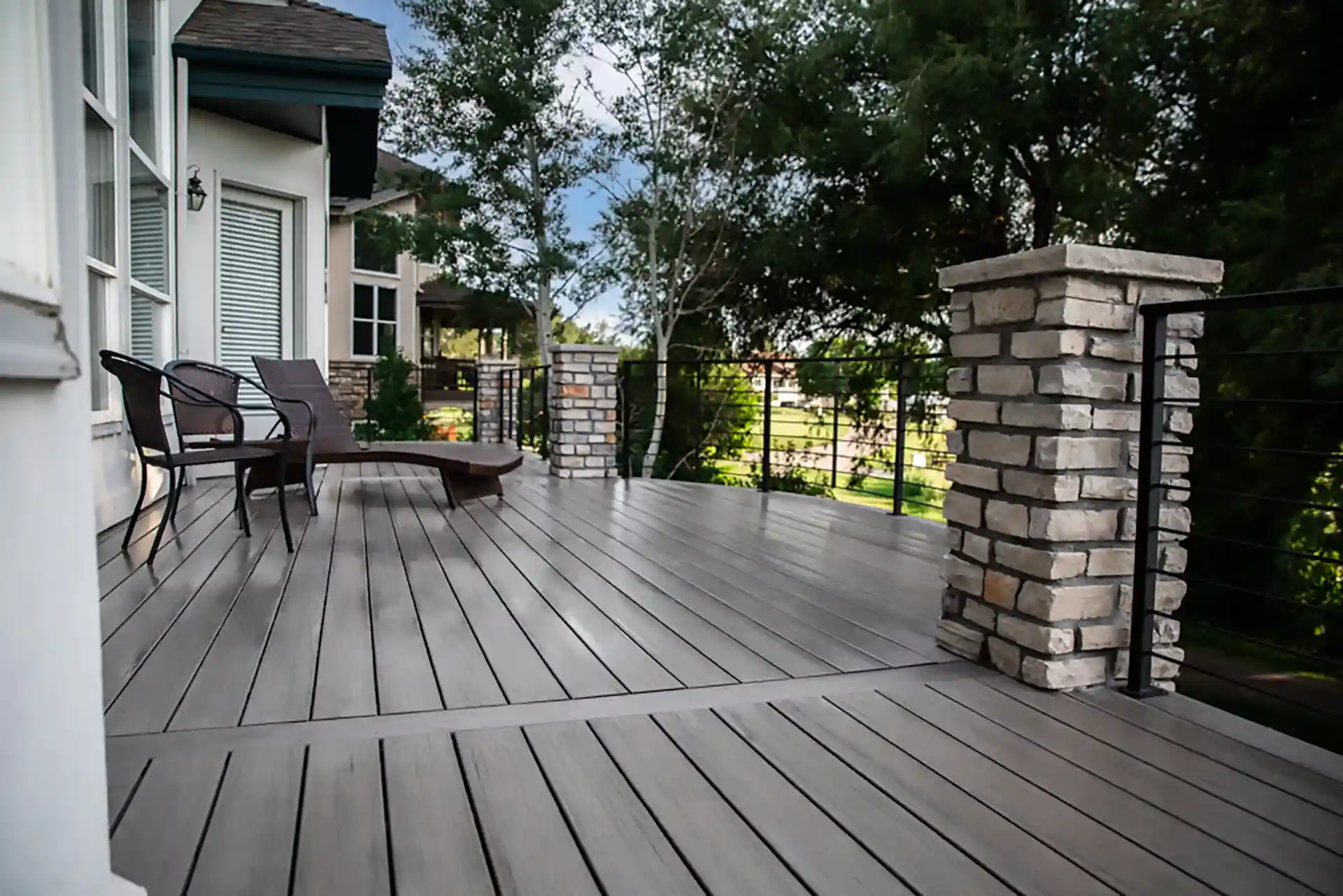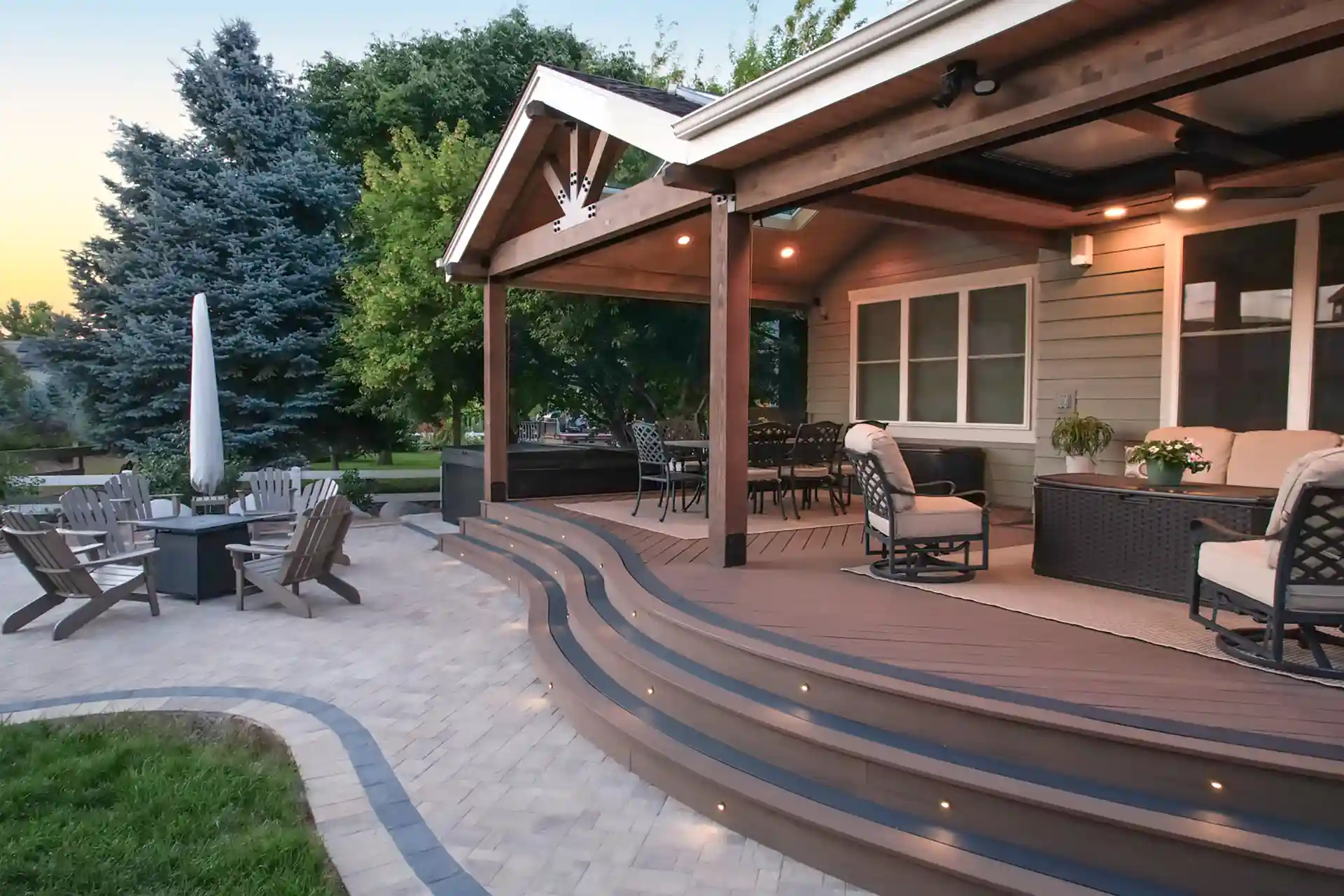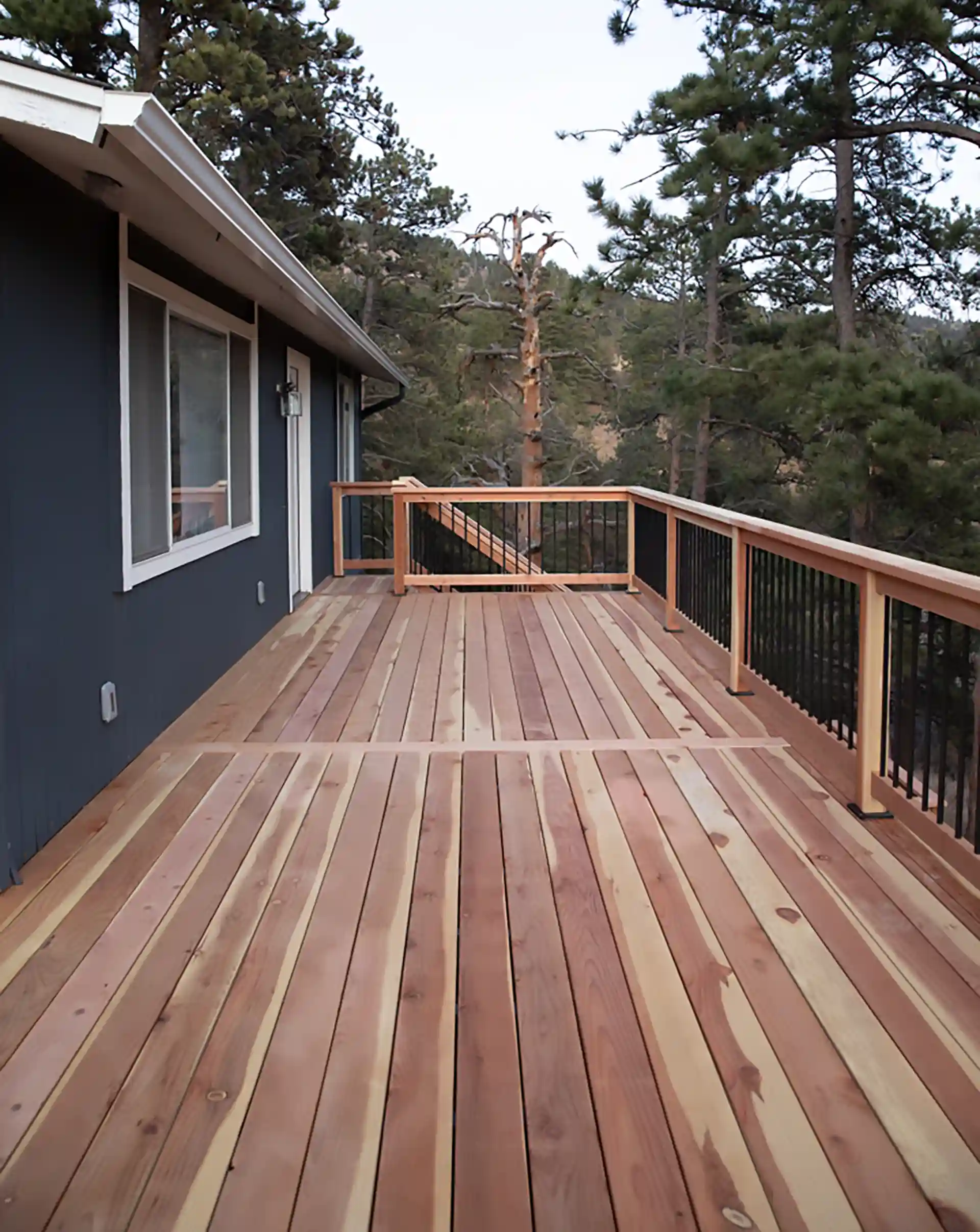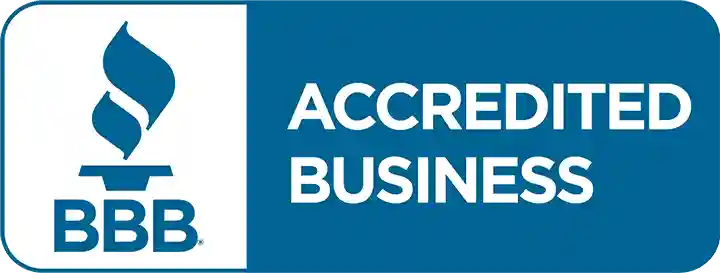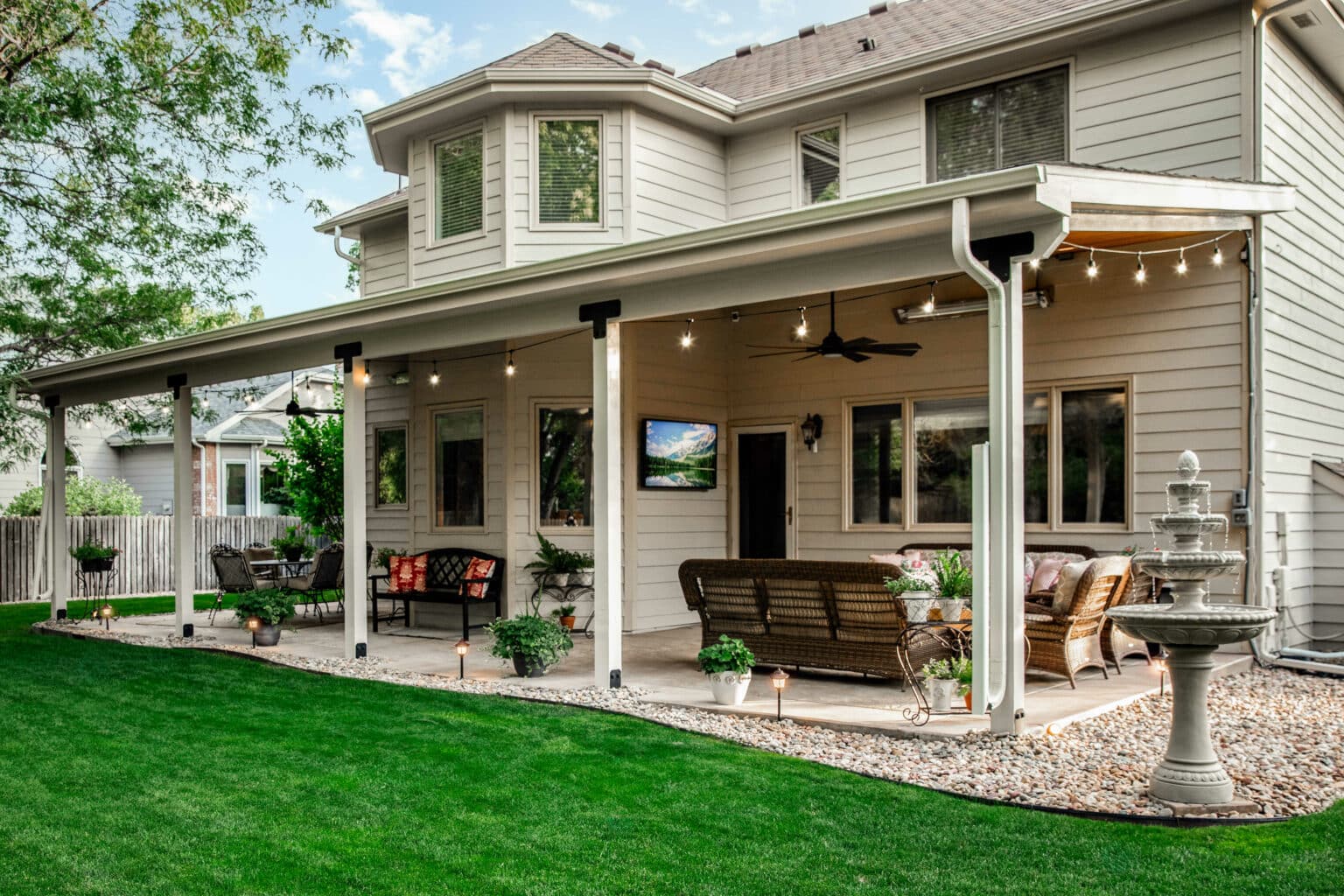Should You Still Build a Deck in 2025? Let’s Talk Value
Inflation, rising material costs, and changes in the housing market dominate the headlines, prompting many homeowners to hesitate before investing in home improvements. Yet, not all spending carries the same weight regarding your home. Building a deck in 2025 offers a practical way to improve your lifestyle and increase your home’s resale value without the high costs of a complete remodel..
A professionally designed and expertly constructed deck offers immense value for Boulder and Castle Pines homeowners. Whether you seek a simple gathering spot or an elaborate multi-level outdoor oasis, a custom deck adds tangible benefits tailored to your budget and property.
Decks Add Livable Square Footage Without the Costs of a Full Remodel
A deck acts as an outdoor room addition at a fraction of the cost and complexity of traditional indoor remodeling projects. Here’s a cost comparison illustrating this:
| Project Type | Average Cost* | Added Usable Space | Typical ROI |
| Full Room Addition (Castle Pines) | $50,000+ | Indoor square footage | 50% – 60% |
| Premium Custom Deck (Colorado) | $20,000 – $30,000 | Outdoor living space | 65% – 75% (higher locally) |
*Costs vary with size, design complexity, materials, and features.
Boulder homeowners favor decks that capitalize on mountain views and seamless indoor-outdoor flow. Castle Pines residents gravitate toward multi-level or curved decks that embrace expansive yards and natural topography.
Top composite decking brands, such as Trex, TimberTech, and Deckorators, provide superior durability and low maintenance, which is ideal for Colorado’s diverse climate.
Understanding Deck Costs: What Influences Your Budget
According to NerdWallet, professional labor for deck installation usually costs between $25 and $35 per square foot. Building a premium deck can cost between $20,000 and $30,000. The exact price will vary based on your chosen materials, ranging from $5 to $50 per square foot.
Factors like deck size, design complexity, and local labor rates also significantly affect the final cost.
Ergeon’s 2025 guide breaks down these costs further, showing that:
- Overall deck costs range widely—from as low as $1,500 for simple decks to over $25,000 for elaborate, custom designs. The national average sits around $8,000.
- Material costs vary significantly, generally between $5 and $50 per square foot, depending on your chosen type. For example:
- Composite decking usually costs between $30 and $80 per square foot installed, offering excellent durability and low maintenance.
- Pressure-treated wood is more affordable upfront, typically $15 to $25 per square foot, but requires ongoing upkeep.
- Labor costs range from $15 to $40 per square foot, influenced by:
- Your geographic location and local labor rates.
- The complexity of your deck design—multi-level or custom features add time and skill.
- Permitting and regulatory requirements vary by area.
- Site conditions, such as demolition of existing decks or terrain challenges.
- The timing and seasonality of the project, with peak seasons often costing more.
Materials Matter: Choosing the Right Decking for Durability and Style
Your choice of decking material will affect how long your deck lasts, how much upkeep it needs, and how it looks over time. Composite options are particularly popular for their resistance to warping, fading, and insect damage.
- Composite Decking: Manufactured from recycled wood fibers and plastic, composite decking resists warping, fading, splintering, and insect damage. Brands such as Trex, TimberTech, and Deckorators offer extensive warranties up to 50 years. These materials require no sealing or staining and withstand Colorado’s weather extremes.
- Pressure-Treated Wood: Although initially more affordable, pressure-treated wood demands regular sealing and maintenance to prevent moisture damage and insect infestation. Its lifespan tends to be shorter and requires ongoing upkeep.
- Tropical Hardwoods: Species like Cumaru and Ipe provide excellent durability and natural resistance but have higher upfront costs and require expert installation.
- PVC Decking: Made entirely of plastic, PVC decking is highly resistant to moisture and stains but is costlier and less common in Colorado residential decks.
What Makes Decks One of the Smartest Investments in Colorado Homes
Return on Investment (ROI):
Decks yield an average ROI between 65% and 75% nationwide, with outdoor-centric markets like Colorado often exceeding those figures due to lifestyle and climate. Professionally built composite decks boost curb appeal and increase resale value, delivering substantial returns on home investment in Castle Pines and Boulder.
Lifestyle Benefits:
Decks expand your living space outdoors, perfect for hosting, relaxing, and enjoying Colorado’s seasons. Customizations such as outdoor kitchens, pergola covers, and fire pits extend your deck’s usability. Integrated deck lighting adds safety and ambiance for nighttime enjoyment.
Navigating Permits, Building Codes, and HOA Rules in Boulder and Castle Pines
Building a deck in Boulder and Castle Pines requires compliance with local permits, building codes, and HOA guidelines. Here’s what you need to know:
1. Building Permits
- Permits are mandatory for deck construction in both Boulder and Castle Pines.
- In Boulder, visit the Building Codes and Regulations page for specific requirements and applications.
- In Castle Pines, the Community Development Building Division provides guidance on permits, safety standards, and inspection processes.
- Applying for permits early helps avoid delays, especially during peak building seasons.
2. Building Codes and Safety Standards
Colorado building codes outline specific safety requirements to ensure durability and safety. Key requirements include:
- Railing Height: Must be at least 36 inches high for residential decks.
- Stair Safety: Secure, code-compliant handrails are required on all stairs.
- Structural Integrity: Decks must be built to support expected loads, preventing sagging or collapse.
- Moisture Protection: Proper footings and flashing help prevent water damage and structural issues.
3. HOA Rules and Design Review
- In Castle Pines, deck projects may require approval from the Castle Pines Design Review Committee.
- The committee evaluates deck size, materials, colors, and overall aesthetics to ensure consistency with neighborhood guidelines.
- Submitting detailed plans early can help streamline the approval process.
Real Talk: Why Now (Not Later) Might Be the Right Time to Build
Delaying your deck project can mean higher costs. Material prices—particularly lumber and composite decking—have been volatile and are projected to rise throughout 2025. Labor shortages continue to challenge availability and pricing for skilled deck builders.
Securing a spring start ensures your deck will be ready for summer enjoyment. Seasonal promotions like $500 off pergolas provide additional savings but don’t last indefinitely.
Starting now also helps avoid the challenges of permit backlogs and HOA delays that can push your project into less favorable weather or missed outdoor use seasons.
Boulder vs. Castle Pines: What Local Homeowners Are Prioritizing in 2025
Boulder and Castle Pines celebrate outdoor living, but their unique characteristics influence deck styles and features.
Boulder:
Homeowners focus on sustainable, eco-friendly materials such as Trex and Deckorators. Rooftop decks maximize limited space and often include built-in seating, planters, and energy-efficient deck lighting. Hideaway screens and sunrooms extend outdoor usability in urban settings.
Castle Pines:
Larger properties allow expansive, multi-level decks, including curved decks. Pergolas, fire pits, outdoor kitchens, and NatureKast hideaway screens create versatile, luxurious outdoor environments. Glass and cable railings preserve natural views while meeting HOA aesthetics.
Pro Tips for Your 2025 Deck Build
- Choose durable composite decking options like Trex, TimberTech, or Deckorators, with extended warranties and minimal upkeep.
- Begin permit applications early to avoid delays in Boulder and Castle Pines.
- Incorporate outdoor kitchens, fire pits, pergolas, and professional lighting to extend deck use and increase home investment in Castle Pines and Boulder.
- Multi-level and curved decks optimize challenging terrain and enhance curb appeal.
- Ensure proper drainage and ventilation to prevent moisture damage and maintain decking integrity.
- Prioritize safety with code-compliant railings and integrated lighting for nighttime enjoyment.
Don’ts for a Successful Deck Project
- Don’t hire contractors without verified licenses and insurance familiar with local building codes.
- Don’t ignore HOA and permitting requirements, which can delay or halt projects.
- Don’t overlook the importance of drainage and ventilation beneath the deck.
- Don’t neglect routine maintenance, even for low-maintenance composite decking.
Detailed Cost Breakdown for Boulder & Castle Pines Decks
| Cost Category | Range (Per Sq. Ft.) | Notes |
| Pressure-Treated Wood | $15 – $25 | Lower upfront cost, higher maintenance, and shorter lifespan |
| Composite Decking | $25 – $38 | Premium brands with long warranties and low maintenance |
| Labor | $25 – $35 | Varies by project complexity; multi-level decks cost more |
| Railings | $20 – $40 | Aluminum, composite, glass, and cable railing systems |
| Permits & Fees | $500 – $1,500 | Mandatory permits vary by size and scope |
| Added Features (Fire Pits, Lighting, Kitchens) | $2,000 – $15,000+ | Adds value and functionality depending on the features selected |
Frequently Asked Questions
Is a deck a good investment in today’s economy?
Yes, decks are among the highest ROI home upgrades, especially in Colorado’s outdoor-focused markets like Boulder and Castle Pines. They increase livable square footage and boost resale value while enhancing outdoor enjoyment.
What’s the average cost of a new deck in Castle Pines or Boulder?
Most custom decks cost between $15,000 and $35,000, depending on size, materials such as composite or wood, and additional features like pergolas or lighting. These costs reflect current market trends for decks that Colorado homeowners are building in 2025.
How long does it take to build a new deck in spring?
A typical deck project takes 2 to 4 weeks from design through completion, although larger or more complex decks may require additional time for permitting and construction.
What makes composite decking worth the extra cost?
Composite decking lasts 25+ years with minimal maintenance, resisting fading, warping, and insect damage. Its long-term durability and lower upkeep costs often make it a smarter investment than traditional wood decking.
What’s included in the $500 pergola offer?
This seasonal promotion applies to custom pergola installations paired with deck or outdoor living projects, helping homeowners add shade and style while reducing project costs.
Comfort + Resale = The Ultimate Win-Win Investment
A custom deck is a daily source of comfort and a strong financial asset. For Boulder and Castle Pines homeowners, investing in professionally built composite decks combined with thoughtfully integrated outdoor features elevates outdoor living while maximizing home investment value.
Investing in a deck in 2025 is more than just a home upgrade—it’s a smart move for boosting comfort and property value. With material prices expected to rise and labor shortages affecting timelines, starting your project now ensures you lock in current rates and enjoy your outdoor space by summer.
Let’s Connect!
Make the most of 2025 with a custom deck that adds value and transforms how you enjoy your outdoor space. Building now means locking in current prices, avoiding delays, and getting more out of your investment. Our team knows how to design and build decks that fit your lifestyle and enhance your property, whether you’re looking for multi-level layouts, composite durability, or integrated features.
Let’s start planning your deck today—reach out to start the conversation!

